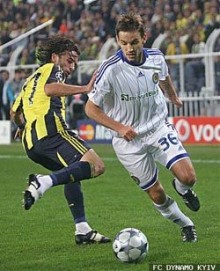ISTANBUL-KYIV – Every time Dynamo Kyiv visits foreign cities to compete in European club tournaments, contacts with local soccer fans are inevitable. In most European countries you will be hard put to find anyone who is not interested in soccer. No matter whom you meet – from government officials to salesclerks – everybody knows about soccer, knows the latest soccer news, and is a fan of the local team.
As a rule, local soccer fans predict their team’s victory, some seriously, some jokingly, even when it is clear that the home team is no match for Dynamo Kyiv; when there is absolutely no chances for success. So you can only imagine the surprise Ukrainian journalists felt when practically every fan of Istanbul’s Fenerbahce team said that the team from Ukraine’s capital city would defeat it.
The reason for this prediction was Fenerbahce’s unimpressive performance during the current season. Its Spanish coach Luis Aragones, who several months ago was instrumental in turning Spain’s national team into the European champion, was not succeeding in turning Fenerbahce into a battleworthy unit. The players who replaced Fenerbahce’s two main attackers were still not capable of leading the game, like the South American player Aurelio and the African player Appiah. As a result, the team ended up in the middle of the Turkish list and lost the first Champions League match to Porto (Portugal).
In contrast, Dynamo Kyiv, coached by Siomin, has been performing impressively in recent times. Although no one in Istanbul knew the name of a single Dynamo player, the game against London’s Arsenal, which ended in a tie on home turf, won respect for the Kyiv team – at least in Istanbul.
Dynamo’s start-up team lineup showed that there was no come-what-may task of defeating Fenerbahce. Otherwise Dynamo wouldn’t have taken the field with a single forward (Bangoura). The strong halfback squad, made up of Vukojevic, Aliyev, Ninkovic, Ghioane, and Yeremenko, was tasked with assisting the forward. However, it was obvious that all five intended to help the fullbacks: Mykhalyk, El Kaddouri, Betao, Diakhate, and the goalie Bogush. There was every indication that Dynamo wanted most of all to stop the other team from scoring a goal after the initial onslaught of the host team to the deafening cheers of fans from the stands.
There was a counterattack. Fenerbahce, like Dynamo, had only one forward, the new Spanish champion of Europe, Daniel Guiza. Instead of trading hardnosed attacks, the Turkish and Ukrainian teams were content to handle every kickoff carefully, each counting on the other to make a mistake. Mistakes were made by both teams, although practically none threatened the other team’s goal in the first 45 minutes of the game, probably because they weren’t that bad or the opponent failed to take advantage of them.
In the second half of the game the host team appeared to keep its worries in check. It started playing in a calmer way and seized the initiative. In fact, Fenerbahce couldn’t afford to storm the Dynamo goal, although there were a few moments that made Dynamo’s goalie and fullbacks really nervous. Several promising counterattacks by Dynamo failed because too few players went on the attack, as they were mostly keeping their eyes on the ball. They succeeded. Dynamo did not lose the game in Istanbul, but neither did our players score a single goal.
Should Siomin’s team be criticized for such a toothless performance? Dynamo knows how to attack and score goals. We have witnessed this on more than one occasion in the past two months. My guess is that Dynamo is still weighed down by the events of last fall, when the team hopelessly lost all six games of the Champions League’s group tournament. It was therefore crucial to avoid something similar in the current competition, and this was accomplished.
Dynamo did not lose the first two Champions League matches, so the Ukrainian team still has a chance of placing even first in the group. However, by constantly playing tied games, Dynamo will have a hard time making progress in the main European soccer tournament.
The team must take the next step: after having learned how not to lose games, it must learn how to win them. The next Champions League games will be played by Dynamo and Porto first abroad and then in Ukraine. Let’s hope Dynamo wins at least once.







